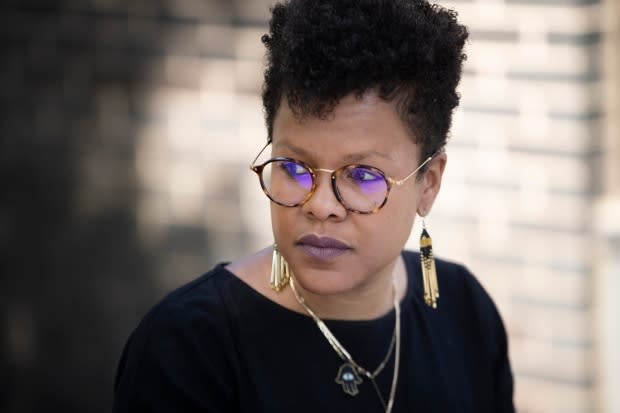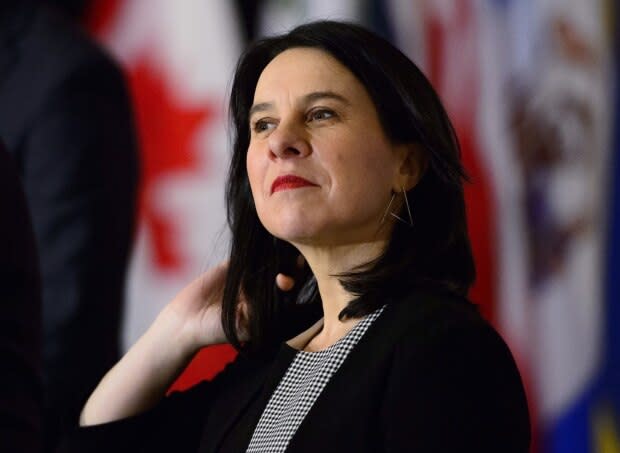Montreal activists lay out blueprint for defunding police
As calls to defund police forces echo across North America, more than 20 community groups are demanding that the budget of the Montreal police service be halved and that those funds be reallocated to specialized community-oriented services.
"We have Black, Indigenous communities that are over-policed, that are victims of police violence and are criminalized," said Marlihan Lopez of Black Lives Matter Montreal at a news conference in Côte-des-Neiges Tuesday.
"We think that moving forward, if we want to reduce that violence, we need to defund the police and invest in our communities and programs that address violence."
As well as Black Lives Matter Montreal, the coalition is made up of the Indigenous Network, sex worker advocates, lawyers' groups and other community groups.
Their call for defunding comes as the Montreal police service (SPVM) is set to unveil a policy on street checks Wednesday. The coalition says such a policy is long overdue, but unless it bans street checks altogether, nothing will really change.
Up until now, the SPVM has had no policy dictating how police conduct street checks — when officers stop people who have not necessarily committed an infraction.
Last year, an independent report found there is systemic bias, and that Indigenous people and Black people were four to five times more likely than white people to be stopped by police.
How would defunding police work?
Thousands of Montrealers have taken to the streets to protest police brutality and racial profiling. However, the coalition believes the police force cannot radically change from within — and that money would be better spent in getting at the root of social problems.
In 2019, the SPVM had an operating budget of more than $662 million — nearly double that of the fire department and more than five times what the city spends on social housing.
The coalition says police would need less funding if sex work and street drugs were decriminalized and if officers were no longer armed.
This isn't the first time activists have demanded the police budget be reduced — but it has become a more mainstream idea due to the current global anti-racism movement.
"It's all connected," said Marie-Livia Beaugé, a lawyer with Hoodstock, a community organization working to reduce inequalities in Montréal-Nord. "Hopefully that is going to put more pressure to the government, to the SPVM, to the city."

"The Minister of Justice sees it's necessary," Beaugé said. "They already know [alternative resources] are necessary."
Beaugé points to Quebec's alternative justice program for people with mental illness or an addiction who face criminal charges. It allows those offenders to receive counselling, do community service or follow some other alternative route to the usual court proceedings.
Beaugé says the approach should be pre-emptive, allowing community groups — instead of police — to intervene and impose solutions.
Hoodstock may even go so far as creating its own community-based response teams to replace police, Beaugé said.
Is defunding police a real possibility in Montreal?
Montreal Mayor Valérie Plante has said she's open to reviewing the way the SPVM is funded.
"This is a big, big conversation," Plante said last month. "I think at this point there are a lot of good ideas coming."
Quebec's Public Security Ministry will put together a team of experts to explore the idea of redistributing police funds to community organizations.
As part of that process, the City of Montreal says it will look at the police budget, alternative approaches to the use of weapons, and social and community responses that could replace police interventions in some cases.

Other cities have taken steps to defund police forces.
In Minneapolis, Minn., where George Floyd's death at the hands of a police officer sparked worldwide mobilization against racism, the city council is taking first steps to defund and dismantle the city's police department and move toward a new model of public safety.
In Los Angeles, the mayor promised to reinvest $150 million of the city's police budget into community and mental health initiatives.
Last week, Toronto city council refused to reduce the police budget, but voted in favour of reforms that could alter the future of policing in the city, including the creation of a non-police response team for mental health calls and the requirement that all officers wear body cameras by 2021.


